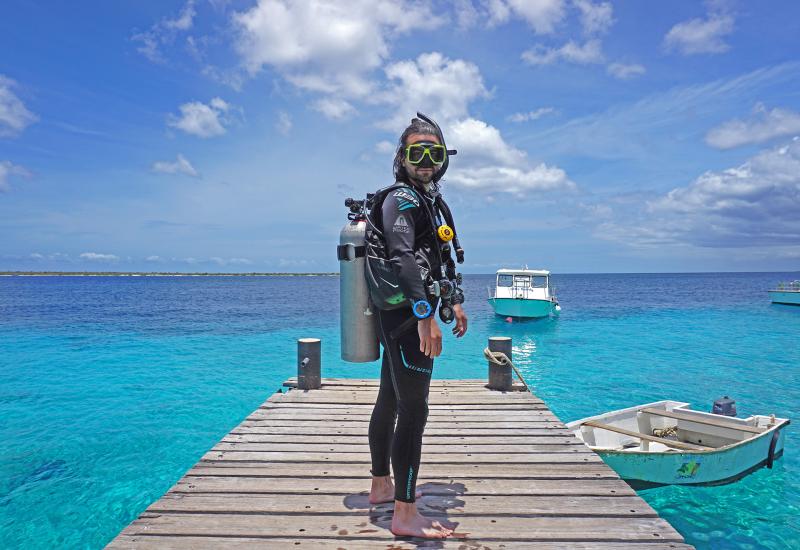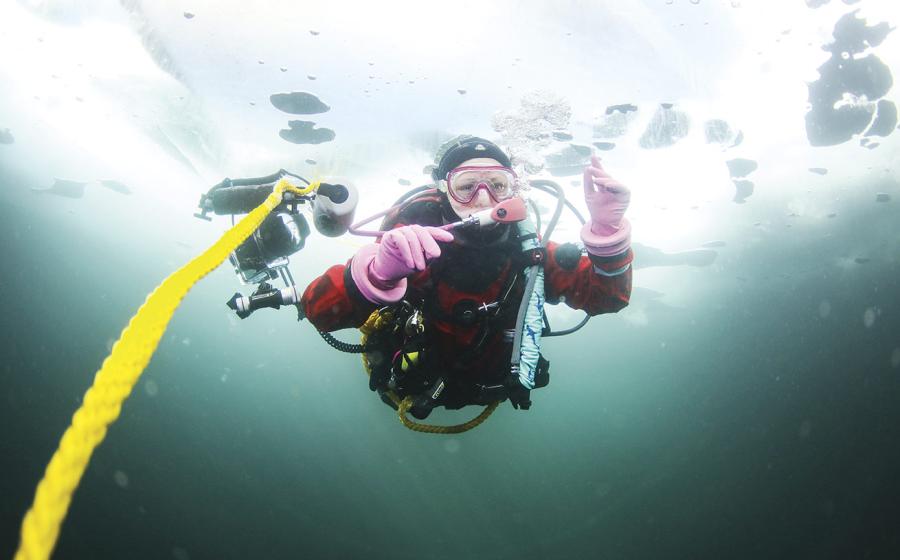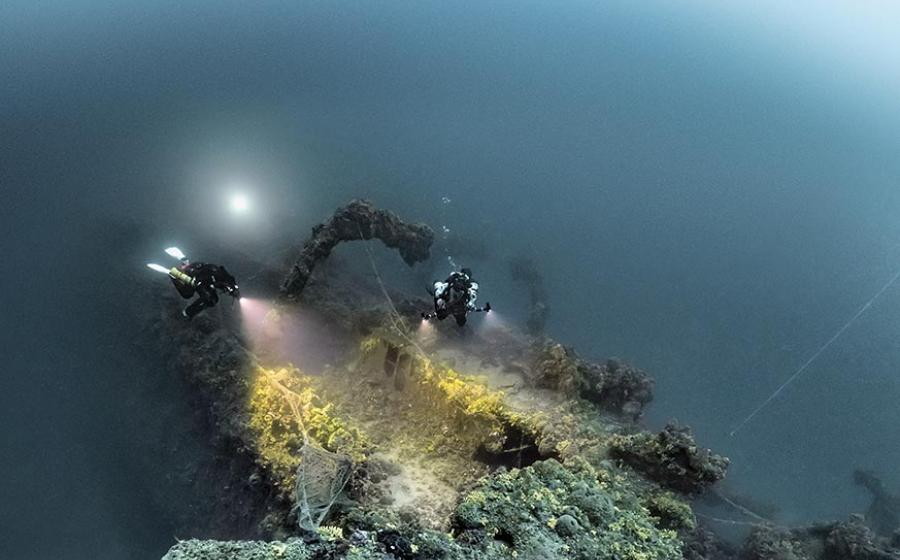Scuba Diving Medical FAQs

iStockCan I scuba dive on my period?
Can I scuba dive on my period?
You can dive while on your period. Some studies suggest that women taking oral contraceptives may be marginally more susceptible to decompression sickness during their period, but the risk is small and can be negated by diving conservatively. Otherwise, there appears to be little evidence of increased risk posed by menstruation.

iStockDo you need to be physically fit to dive?
Do you need to be physically fit to dive?
Difficult conditions like heavy current or surface chop may increase the need for physical fitness, but recreational diving in good conditions can be performed by the average healthy adult. Diving can be strenuous, but divers do not need to be endurance athletes to enjoy the aquatic world. If you exercise regularly at an intensity that keeps your heart rate above 70 percent of maximum for more than 90 minutes per week, it is likely that you are fit enough to dive recreationally in many conditions. Use this guide to help gauge your fitness before considering diving.

iStockCan I go scuba diving if I’m pregnant?
Can I go scuba diving if I’m pregnant?
Most dive medicine experts agree that while the risk to the mother and the child may be small, it is avoidable, and it would be prudent to avoid diving during the term of the pregnancy. There are some risks inherent in all diving, even training dives performed in a pool. Dive injuries like arterial gas embolism and pulmonary barotrauma can occur in water as shallow as 4 feet, and both have the potential to cause serious symptoms. DCS is a risk for both the mother and the fetus as well, and the treatment for DCS, hyperbaric oxygen therapy, carries its own risks and may have the potential to cause fetal harm. Remember, bubbles in the fetal circulation can go directly to the arterial circulation. Some individuals do decide to dive while pregnant with no ill effects, but you should have an honest discussion with your physician before considering diving during the course of a pregnancy.

iStockCan I dive with a heart arrhythmia?
Can I dive with a heart arrhythmia?
With clearance and approval from a cardiologist, you can dive with some types of arrhythmias. Here are some of the most common arrhythmias and their current recommendations in relation to diving:
Atrial Fibrillation
Atrial fibrillation (AFib) is the most common form of arrhythmia. Presenting as a fast and irregular heartbeat, AFib results from the disturbance of the many electrical signals that make the heart contract in a controlled rhythm. While some individuals may never experience AFib symptoms despite its presence, individuals with atrial fibrillation should seek qualified medical evaluation. Some divers with AFib can dive, but individuals who experience recurring episodes of AFib, and individuals on certain medications that can be used to treat AFib, should avoid diving.
Extrasystole
Extrasystole is a condition in which heart beats occur outside of the heart’s regular rhythm. A specific type of extrasystole called a premature ventricular contraction, or PVC, can be found in as many as 75 percent of healthy individuals, according to some studies. Divers who experience PVCs should consult their physician, but most divers with benign PVCs may be able to return to diving after a thorough evaluation.
Syncope
Syncope is an abrupt loss of consciousness followed by a relatively quick recovery. The causes of syncope can range from the benign to the life threatening. Because of the potential for injury caused by loss of consciousness in the water, syncope can be particularly challenging to address. Divers who experience syncope will rarely be cleared for diving by their physicians and only after the underlying causes of the symptoms have been identified and completely addressed.
For more information on diving with arrhythmias, visit the DAN Health and Diving Library.

iStockAm I allowed to dive if I’m taking medications?
Am I allowed to dive if I’m taking medications?
This is a very frequently asked question, but the answer is very individual and rarely straightforward. The condition that requires the medication may be the concern. Because of the wide range of medications that could come in to play, and their effects, it is impossible to give a universal answer. It is possible to dive while taking many medications, with all other factors being considered equal, but prospective divers must consult their doctor before considering diving while on medication. You can find a brief overview of some medications and their possible complications here.

iStockCan I scuba dive if I’m diabetic?
Can I scuba dive if I’m diabetic?
With approval from your doctor, you can dive with diabetes, with some qualifications. The diabetes must be well controlled and without evidence of diabetic complications. Potential divers with diabetes must first establish baselines for the effects of exercise on their blood sugar levels by recreating some of the surface activities associated with diving (like carrying tanks, or loading dive gear). Assuming there are no issues with hypoglycemia during these exercises, divers should begin diving in a controlled environment and progress to a calm open-water environment. Divers can gradually increase the depth of their dives, while keeping a log of their corresponding diet and blood sugar. Divers with diabetes should avoid depths greater than 100 feet, dives longer than 60 minutes, and situations that may exacerbate the risk of hypoglycemia like cold water, strong currents, or other strenuous conditions.

iStockCan I get scuba diving certified if I have asthma?
Can I get scuba diving certified if I have asthma?
Asthma has long been a controversial subject in diving. Traditionally, divers with asthma have been excluded from diving. Because asthma is characterized by a narrowing of the bronchi in response to a variety of stimuli, the potential for an asthma attack in the water presents a significant and avoidable risk. Information from DAN researcher analysis of diving incidents suggests that divers with asthma may have a slightly greater risk of decompression sickness (also known as “the bends”), and that asthma has caused some diving fatalities. DAN recommends that divers with asthma speak to a physician who is knowledgeable about diving medicine before considering diving. More information on asthma and diving can be found here.

iStockI can’t swim to the bottom of the pool without my ears hurting. Will this prevent me from scuba diving?
I can’t swim to the bottom of the pool without my ears hurting. Will this prevent me from scuba diving?
There are some ear conditions that will prevent you from diving, but feeling some pain or discomfort while swimming to the bottom of the pool without equalizing your ears is normal. As divers, we equalize our ears throughout every descent to avoid the pain you would otherwise feel. Descending in the water adds approximately one-half pound of pressure on each square inch of your body for each foot of the descent, and the pressure diminishes at the same rate as you ascend. As pressure increases during the descent, it compresses the closed air spaces in our ears and sinuses that are not equalized, causing pain. We equalize by allowing air to ventilate our middle ear spaces and sinuses as we descend to make the pressure equal to the external pressure of the water. While diving, you will equalize your ears throughout the entire descent, and you should feel no pain. Visit the DAN Health and Diving library for more information.

Divers Alert NetworkDivers Alert Network
This FAQ is brought to you by the dive medical experts at Divers Alert Network.










